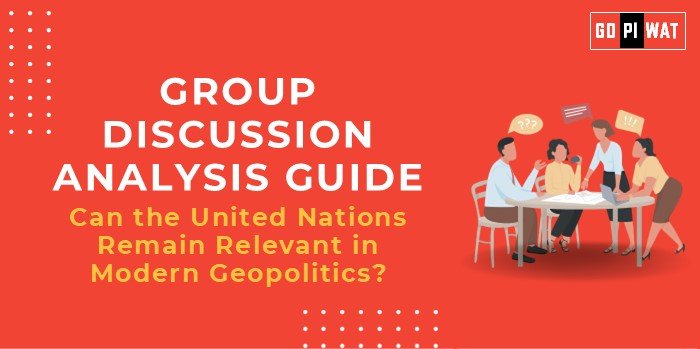📋 Group Discussion (GD) Analysis Guide
🌟 Can the United Nations Remain Relevant in Modern Geopolitics?
🌐 Introduction to the Topic
Opening Context: The United Nations (UN), established in 1945, has been pivotal in maintaining international peace and security, promoting human rights, and fostering cooperation. However, modern geopolitics, marked by rising multipolarity, economic rivalries, and regional conflicts, raises questions about its continued effectiveness and relevance.
Topic Background: The UN was created to prevent conflicts after World War II, but changing power dynamics, technology, and global challenges like climate change and cyber warfare demand a reassessment of its role.
📊 Quick Facts and Key Statistics
- 🗓️ Founding Year: 1945 – The UN was created by 51 member states; it now has 193 members.
- 💰 Budget: $3.2 billion (2023) – Significantly lower than many individual nations’ defense budgets.
- 🌍 Peacekeeping Operations: 12 active missions (2023) – Focused on regions like Mali, DR Congo, and Cyprus.
- ⚖️ Security Council Structure: 5 permanent members with veto power (USA, Russia, China, UK, France) – A frequent point of contention.
- 🌎 Global Challenges: $100 billion annual gap in climate finance needs (2024).
👥 Stakeholders and Their Roles
- 🌍 Member States: Provide funding, troops, and policy direction.
- ⚖️ Security Council: Ensures peace and security but often faces deadlocks due to vetoes.
- 🗳️ General Assembly: A forum for global consensus-building.
- 🤝 NGOs and Civil Society: Act as partners in implementing development programs.
- 🏢 Multilateral Institutions: Collaborate on specialized goals (e.g., WHO, UNESCO).
🏆 Achievements and Challenges
- 🎯 Achievements:
- Global Peacekeeping: UN peacekeeping forces deployed to over 70 missions, significantly reducing conflict durations.
- Sustainable Development Goals (SDGs): Driving global initiatives on poverty, education, and climate.
- Humanitarian Aid: Provided life-saving assistance to over 250 million people annually.
- ⚠️ Challenges:
- Geopolitical Deadlocks: Frequent veto use in the Security Council undermines decision-making.
- Inadequate Funding: Chronic shortfalls in peacekeeping and climate action budgets.
- Reform Resistance: Calls for Security Council expansion and veto reform face opposition from P5 members.
🌍 Global Comparisons
- 🇳🇴 Success: Nordic countries show strong collaboration with UN-led initiatives like climate action.
- 🇸🇾 Challenges: The failure to prevent the Syrian Civil War illustrates structural inefficiencies.
Case Studies:
- 🕊️ UN Role in Yemen: Mediated ceasefires in the face of a dire humanitarian crisis.
- 🌍 Paris Climate Agreement: Facilitated by the UN Framework Convention on Climate Change (UNFCCC).
📋 Structured Arguments for Discussion
- ✔️ Supporting Stance: “The UN remains indispensable as a platform for multilateral diplomacy, offering mechanisms for conflict resolution and global governance.”
- ❌ Opposing Stance: “The UN has failed to address critical crises like Ukraine and Syria, reflecting its structural and operational inadequacies.”
- ⚖️ Balanced Perspective: “While the UN has been effective in areas like public health and climate change, its political structures need urgent reform to address modern challenges.”
🛠️ Effective Discussion Approaches
- 🔍 Opening Approaches:
- “Since 1945, the UN has prevented a third World War, but does this justify its relevance in a polarized world?”
- “With rising powers like India and Brazil demanding a greater say, is the UN structure still fair?”
- 💬 Counter-Argument Handling:
- Acknowledge inefficiencies but highlight successes like SDG adoption.
- Point to ongoing reform initiatives like the Group of Four’s (G4) efforts for Security Council expansion.
📈 Strategic Analysis of Strengths and Weaknesses
- 🟢 Strengths: Universal membership, vast development programs, peacekeeping capabilities.
- 🟡 Weaknesses: Bureaucracy, reliance on member contributions, P5 veto misuse.
- 🔵 Opportunities: Reforms for inclusivity, stronger role in climate governance.
- 🔴 Threats: Rising nationalism, reduced funding, alternative alliances (e.g., BRICS).
📚 Connecting with B-School Applications
- 🌏 Real-World Applications: Multilateral project planning, leadership in global governance, policy negotiation.
- 🤔 Sample Interview Questions:
- “How would you reform the UN Security Council to make it more effective?”
- “What lessons can businesses learn from the UN’s coordination efforts?”
- 💡 Insights for B-School Students:
- Importance of stakeholder collaboration.
- Lessons in diplomacy and crisis management.


